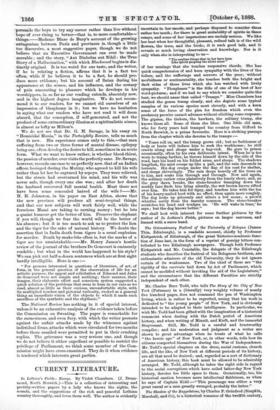CURRENT LITERATURE.
In .Lothian's Fields : Essays. By Violet Chambers. (J. Drum- mond, North Berwick.)—This is a collection of interesting and prettily-written papers by a lady who knows the sights, the sounds, and the suggestions of the rich and peaceful Lothian country thoroughly, and loves them well. The author is evidently uncertain in her moods, and perhaps disposed to consider them rather too much ; for there is great mutability of spirits in these essays, and some of her impressions are unduly serious. We like her best when her thoughtful, pleasant, refined talk is of the wild flowers, the trees, and the birds; it is such good talk, and it reveals so much loving observation and knowledge. Nor is it only when she is interpreting to us— "The soulless things that to her have been Like spirits peopling the silent scene " of her musings that she touches responsive chords. She has quick comprehension of and keen sympathy with the lives of the toilers, and tho sufferings and sorrows of the poor; without morbidness or sentimentality, she touches both the bright and dark sides of those lives which she has watched with lively sympathy. " Ploughmen " is the title of one of the best of her word-pictures; and if we had to say which we consider quite the best, we should name that called " Tramps." Miss Chambers has studied the genus tramp closely, and she depicts some typical samples of its various species most cleverly, and with a keen sense of the force of the plea for freedom which even the predatory prowler cannot advance without eliciting some response. The gipsies, the tinkers, the hawkers, the solitary tramp, she knows them all. Some of them she likes. One little old man, who for forty years had tramped the country from Gifford to North Berwick, is a prime favourite. Here is a striking passage from the chapter which she devotes to the tramps :— "Years roll on, and the tramp grows old; but no feebleness of body or brain will induce him to seek the workhouse ; he still crawls along and sleeps under a hay-rick. He goes to prison occasionally, often by his own deliberate intent. When he is too worn to tramp farther, he throws himself down by the side of the road, lays his head on his folded arms, and sleeps. The shadows lengthen, the mist creeps np like a pall, and the rain descends in torrents. His dog creeps under the flap of his coat for shelter, and sleeps shiveringly. The rain drops heavily off the trees on to him, and soaks him through and through. Now and again, the solitary curlew cries plaintively from the lonely shore, and, as the grey dawn breaks, the stone-breaker tramping down the muddy lane finds him lying silently, the wet brown leaves sifted over him. He takes him for tipsy, and touches him with the toe of his heavy-nailed boot with no effect, then again more roughly. The dog looks up piteously and utters a low moan; a peewit whistles eerily from the marshy common. The stone-breaker scratches his head and trudges on. 'He will wake in time,' he says ; but the dog knows better."
We shall look with interest for some further pictures by the author of In Lothian's Fields, pictures on larger canvases, and limned with a surer hand.


































 Previous page
Previous page